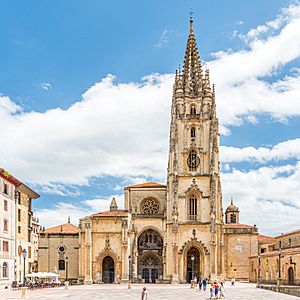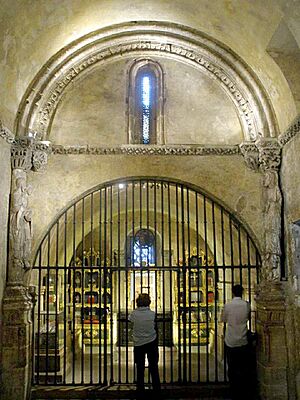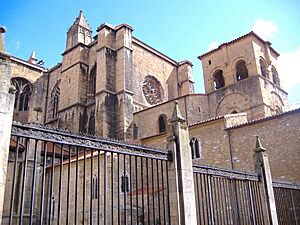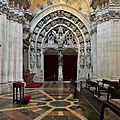Oviedo Cathedral facts for kids
Quick facts for kids Cathedral of the Holy Saviour |
|
|---|---|
|
Catedral de San Salvador
|
|

Façade of the cathedral
|
|
| Religion | |
| Affiliation | Roman Catholic Church |
| Ecclesiastical or organizational status | Cathedral, Minor basilica |
| Leadership | Archbishop Jesús Sanz Montes |
| Location | |
| Location | Oviedo, Spain |
| Architecture | |
| Architect(s) | Rodrigo Gil de Hontañón |
| Architectural type | Church |
| Architectural style | Gothic, Romanesque, Baroque, Renaissance |
| Groundbreaking | 781 |
| Direction of façade | O |
| Type | Cultural |
| Criteria | ii, iv, vi |
| Designated | 1993 (17th session) |
| Parent listing | Routes of Santiago de Compostela: Camino Francés and Routes of Northern Spain |
| Reference no. | 669bis-005 |
| Region | Europe and North America |
| Type | Non-movable |
| Criteria | Monument |
| 3 June 1931 | |
| RI-51-0000785 | |
| Website | |
| Official Website: http://catedraldeoviedo.com/ | |
The Cathedral of San Salvador is a very old and important Catholic church in the city of Oviedo, located in the Asturias region of northern Spain. It's also known as the Metropolitan Cathedral Basilica of the Holy Saviour.
This amazing building shows many different styles of architecture. You can see parts that are Pre-Romanesque, Romanesque, Gothic, Renaissance, and even Baroque. It's like a history book built with stone!
Contents
History of the Cathedral
The story of the Cathedral of San Salvador began a very long time ago. The first church on this spot was a large building from the Pre-Romanesque period. It was ordered by King Alfonso II of Asturias.
Early Beginnings
King Fruela I of Asturias founded the cathedral in 781 AD. His son, Alfonso II of Asturias, also known as Alfonso the Chaste, made it bigger in 802. Alfonso II made Oviedo the capital of the Kingdom of Asturias. He also created the See of Oviedo in 810.
Building the Gothic Cathedral
The main Gothic building you see today was started much later, in 1388. Bishop Gutierre of Toledo began this work. The tall tower was added by Cardinal Francisco Mendoza de Bobadilla in 1528.
Over the centuries, many people worked on the cathedral. For example, Archbishop Pelagius of Oviedo helped restore it in the 12th century. Later, Bishop Fernando Alvarez started building the cloister, which is a covered walkway around a courtyard.
At the end of the 13th century, the new Gothic basilica began to take shape. Many different builders and artists contributed to its design. They added chapels, stained-glass windows, and beautiful carvings. The magnificent tower, with its octagonal top, was finished in 1551. It is considered a wonder of Gothic architecture.
Modern Additions and Restoration
In the 17th century, more parts were added, like the ambulatory (a walkway around the altar) and several Baroque chapels. In the 18th century, an older church next to the cathedral was replaced with a new Baroque chapel.
The entire cathedral complex underwent a major restoration from 1998 to 2002. This project helped preserve the building for future generations.
Important Parts of the Building
The Cathedral of Oviedo is a complex building with many interesting sections. Its origins are tied to the royal court of the Kingdom of Asturias.
The Holy Chamber (Cámara Santa)

One of the most special parts of the cathedral is the Cámara Santa (which means "Holy Chamber"). This is the only part that remains from the very old medieval complex. It was built to keep important treasures and holy items. These include the famous Cross of the Angels and the Victory Cross. These crosses are important symbols of the Asturian monarchy.
The Holy Chamber is a two-story building. The lower floor holds several burials. The upper floor keeps a collection of royal treasures and relics. In the 12th century, the Holy Chamber was updated. It received beautiful Romanesque statues of the Apostles. A curved ceiling was also added.
The Old Tower (Torre Vieja)
Another old part is the "Torre Vieja" or "Old Tower." This bell tower has very old foundations. It was made taller with an arched gallery and a ribbed vault.
The Gothic Cloister
The Gothic cloister was started around 1300 but finished in the mid-15th century. It's a rectangular area with covered walkways. The windows show how the Gothic style changed over time.
The Main Church Building
The main church building, with its tall ceilings and aisles, was built gradually. The old Pre-Romanesque church was slowly replaced. The main chapel, where the altar is, was finished by 1451. By 1500, most of the cathedral, including the main and side aisles, was complete.
The western front of the cathedral, including its impressive tower, was the last part to be finished. The tower was completed in 1551. Its design combines Gothic and Renaissance styles.
Important Burials
Many important people are buried in the Cathedral of San Salvador. These include:
- Saint Eulogius of Córdoba
- Fruela I of Asturias
- Munia of Álava, wife of Fruela I
- Teresa Ansúrez, wife of Sancho I of León
- Alfonso III of Asturias
- Jimena of Pamplona, wife of Alfonso III of Asturias
- Saint Leocadia
- Saint Pelagius of Córdoba (912-925), a young martyr
- García I of León
- Ordoño I of Asturias
- Ramiro I of Asturias
Images for kids
See also
 In Spanish: Catedral de Oviedo para niños
In Spanish: Catedral de Oviedo para niños
 | William L. Dawson |
 | W. E. B. Du Bois |
 | Harry Belafonte |





